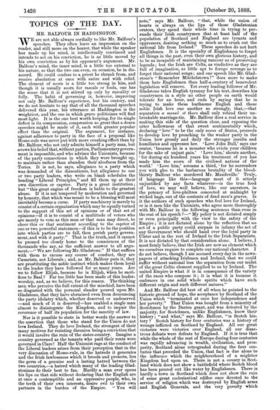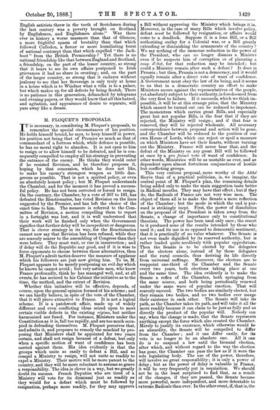TOPICS OF THE DAY.
MR BALFOUR IN HADDINGTON.
Wii are not able always cordially to like Mr. Balfour's speeches. They often leave an impression on the reader, and still more on the hearer, that while the speaker has made up his mind, is intellectually convinced and intends to act on his conviction, he is as little moved by his own conviction as by his opponent's argument. Mr. Balfour's mind, the inner mind, is a little too external to his nature, so that the two can even, on occasion, be in dis- accord. He could confess to a priest he shrank from, and receive absolution at once with satire and with relief. The element of scorn is a little too strong in him, and though it is usually scorn for rascals or fools, one has the sense that it is not stirred up only by rascality or folly. The habit of governing is, however, improving not only Mr. Balfour's experience, but his oratory, and we do not hesitate to say that of all the thousand speeches delivered this year, his utterance at Haddington is the weightiest, and the one in which grave politicians will find most light. It is the one best worth keeping, for its single defect is its compression, compression so great that a dozen speeches might be made of it, each with greater popular effect than the original. The argument, for instance, against adherence to party in the face of a proposal like Home-rule was never put with more crushing effect than by Mr. Balfour, who not only admits himself a party man, but avows his belief that, without parties, Parliamentary govern- ment is impossible, and who advises the Unionists, because of the party connections in which they were brought up, to maintain rather than abandon their aloofness from the Tories. It is not, he says, allegiance to a party which was demanded of the dissentients, but allegiance to one or two party leaders, who write on blank schedules the heading "Liberal Principles," and fill them up at their own discretion or caprice. Party is a great institution ; but "this great engine of freedom is liable to the greatest abuse. If it is not tempered by moderation and governed by honesty, that which was meant to be a blessing will most inevitably become a curse. If party machinery is merely to consist of a certain organisation which may be equally turned to the support of this set of opinions or of that set of opinions—if it is to consist of a multitude of voters who are merely to vote as this man or that man may direct, to cheer this or that sentiment according to the caprice of one or two powerful statesmen—if this is to be the position into which parties are to fall, then perish party govern- ment, and with it party." That is the truth, and it cannot be pressed too closely home to the consciences of the thousands who say, as the sufficient answer to all argu- ment,—" We are following Mr. Gladstone." If that suffices with them to excuse any course of conduct, they are Cresarists, not Liberals ; and, as Mr. Balfour puts it, they are prostituting the noble instinct which makes them loyal to the leader they have followed for so many years. Are we to follow Elijah, because he is Elijah, when he sacri- fices to Baal ? Far too little has been made of this leader- worship, and, as we believe, for this reason. The thinking men who perceive the full extent of the mischief, have been so disgusted with the personal slander poured upon Mr. Gladstone, that they have abstained even from denouncing the party idolatry which, whether deserved or undeserved —and much of it is deserved—has enabled a single man almost to disintegrate the Kingdom, and to impair the reverence of half its population for the sanctity of law.
Nor is it possible to state in better words the answer to the assertion that those who stand for the Union do not love Ireland. They do love Ireland, the strongest of their many motives for resisting disunion being a conviction that it would involve the ruin of the sister-country. Imagine a country governed as the tenants who paid their rents were governed in Clare! Half the Unionist rage at the conduct of the Liberal leaders arises from their perception that in the very discussion of Home-rule, in the hatreds it generates and the Irish lawlessness which it breeds and protects, lies the germ of a genuine and. a lasting hatred between the two countries,—a hatred which many of the leading Glad- stonians do their best to fan. Hardly a man ever opens his lips on that side without declaring that the English are at once a contemptible and an oppressive people, who, in the teeth of their own interests, desire evil to their own partners in the burden of the Empire. "You will note," says Mr. Balfour, "that, while the union of hearts is always on the lips of those Gladstonian orators, they spend their whole time in trying to per- suade their Irish countrymen that at feast half of the population of Scotland and England are tyrants and oppressors, desiring nothing so much as to crush out the national life from Ireland." These speeches do not hurt Englishmen. It is the specialty of Englishmen to forget all things in the past, even their own glorious history, and to be as incapable of maintaining rancour as of preserving legends ; but the Irish are Celts, as vindictive as they are full of imagination, as little apt to forego revenge as to- forget their national songs ; and one speech like Mr. Glad- stone's "Remember Mitchelstown !" does more to make them hate Englishmen than half-a-century of benevolent legislation will remove. Yet every leading follower of Mr. Gladstone takes English tyranny for his text, describes his countrymen in a style no other people on earth would tolerate for an hour, and ends by saying that he is. trying to make these loathsome English and these noble Irish love one another so strongly, that,—that separation a menet et th,oro shall only rebind their un- breakable marriage-tie. Mr. Balfour does a real service in making this side of the question clear, and exposing the utter hollowness of that sweet sentimentality which, declaring " love " to be the only nexus of States, proceeds to develop love by preaching to the weaker party in the Union how grossly and daily the stronger insults and humiliates and oppresses her. 'Love John Bull,' says one orator, because he is a monster who evicts your children for the sake of unjust gain.' 'Love him,' shouts another, for during six hundred years his treatment of you has made him the scorn of the civilised nations of the world." Love him,' screams a third, for he surrenders you with glee to the barbarous brutality of the blood- thirsty Balfour who murdered Mr. Mandeville.' Truly, if language like this—language most of it utterly unjustified by any facts whatever—is the true food of love, we may well believe, like our ancestors, in the potency of love-philtres concocted at midnight by wicked hags, out of the contents of dead men's graves. Is it the authors of such speeches who feel love for Ireland, or is it men like the Unionists, who agree more thoroughly with Mr. Balfour in the following sentences than even in the rest of his speech 9—" My policy is not dictated simply or even principally with the view to the safety of the Empire ; it is not dictated alone by the reflection that no- act of a public party could surpass in infamy the act of any Government who should hand over the loyal party in Ulster and in the rest of Ireland to the Irish Separatists. It is not dictated by that consideration alone. I believe, I most firmly believe, that the Irish are now an element which we ourselves require to complete our national character. I do not believe, though I am accused every day in the news- papers of attacking Irishmen and Ireland, that we could suffer without national loss the separation from our midst of the great Celtic element supplied to us by Ireland. The united Empire is what it is in consequence of the variety of the races who compose it ; it is what it is because it embraces in one solid whole spirits which have such different origin and such different natures."
And Mr. Balfour did best of all when he pointed to the historic ground of hope, the acceptance by Scotland of the Union which "terminated at once her independence and her poverty." That Union was bought from a minority of Scotchmen by the Darien grant, and was detested by the majority, for Scotchmen, unlike Englishmen, know their history ; "and what," says Mr. Balfour, "is Scotch his- tory? Scotch history for four centuries was a history of wrongs inflicted on Scotland by England. All our great victories were victories over England, all our disas- trous defeats were defeats by England. If it is true that while the whole of the rest of Europe during four centuries was rapidly advancing in wealth, civilisation, and pros- perity, Scotland alone retrograded during the four cen- turies that preceded the Union, that fact is due alone to the influence which the neighbourhood of a mightier Kingdom had upon us. There is not a county in Scot- land which does not show a battlefield where Scotch blood has been poured out like water by Englishmen. There is hardly a town in Scotland which does not show the ruin of some great ecclesiastical edifice once devoted to the service of religion which was destroyed by English arms and English Generals, and the very poverty which English satirists threw in the teeth of Seotchmen during the last century was a poverty brought on Scotland by Englishmen, and Englishmen alone." Was there ever in history a worse massacre than that of Glencoe, a more frightful spasm of brutality than that which followed Culloden, a fiercer or more humiliating burst of national contempt than that which expelled "the Jack- boot" from the British Premiership ? Yet there is no national friendship like that between England and Scotland, a friendship, on the part of the lesser country, so strong that it bears to see its own affairs postponed to Irish grievances it had no share in creating ; and, on the part of the larger country, so strong that it endures without jealousy to see that her Sovereign is only truly at home in a house which is to Windsor what a villa is to a palace, but which makes up for all defects by being Scotch. There is no patience in this generation, debauched by telegrams and evening papers, or they would know that all this hatred, and agitation, and appearance of desire to separate, will pass away like a dream.



































 Previous page
Previous page